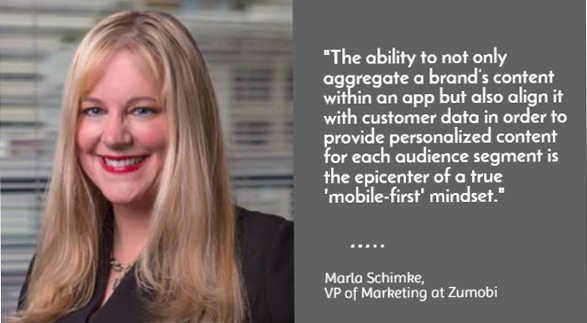Q&A: Personalized Experiences On the Go

With 71 percent of consumers reporting they like receiving personalized offers from preferred brands and retailers and the majority owning a smartphone, marketing officers need to question the effectiveness of their mobile campaigns when it comes to providing end-users with dynamic personalized content based on preferences and the device they are using.
Unlike many traditional forms of advertising, content marketing humanizes the user experience and is a viable option for connecting with today's on-the-go consumer who expects to be treated like an individual with unique interests, needs and behaviors. Zumobi's VP of Marketing, Marla Schimke, discusses these points and more below:
1) How do you define content marketing?
 Marla Schimke, Zumobi: Content marketing is a strategic marketing approach focused on creating and distributing valuable content to engage and retain a specific audience while ultimately driving a profitable customer action. They key to good content is value - irrespective of medium (long-form or short-form content, YouTube, Vine, Instagram, etc.) - to curate an interactive conversation between brands and consumers. It's about establishing user engagement, activation, and creating brand loyalists.
Marla Schimke, Zumobi: Content marketing is a strategic marketing approach focused on creating and distributing valuable content to engage and retain a specific audience while ultimately driving a profitable customer action. They key to good content is value - irrespective of medium (long-form or short-form content, YouTube, Vine, Instagram, etc.) - to curate an interactive conversation between brands and consumers. It's about establishing user engagement, activation, and creating brand loyalists.
2) Why is mobile a good platform on which to promote a brand's content marketing?
Schimke, Zumobi: Since one in five people own a smartphone worldwide, at any given time more than 1.4 billion individuals across the globe are heads down in their mobile devices. People are attached to their smartphones, jumping between apps to reading about the changes in mortgage rates via a mobile content hub, perusing a suggested article about the return of film noir, liking an update on Instragram, while concurrently tweeting about buying tickets to next week's Lakers game - all in two minutes.
According to Fast Company, 63 percent of smartphone owners keep their phone with them for all but an hour of their waking day. According to Mary Meeker's annual trends report, millennials love their smartphones, perhaps even more than their best friend. In fact, 87 percent say that their smartphones "never leave my side," 80 percent say that the first thing they do upon waking is "reach for my smartphone," and 60 percent believe that in the next five years "everything will be done on mobile devices."
In short, never before have brands had a similar degree of virtually unlimited access to their targeted consumers. The mobile platform provides brands the opportunity to be in constant, engaging and meaningful communication with their consumers, everywhere and always.
3) What are some examples of content marketing campaigns that feel more personal than perhaps traditional ads would have?
Schimke, Zumobi: Personally, I'm less focused on campaigns and more focused on experiences that have meaning. I want a marketer to get to know me, creating an ongoing dialogue and value exchange. I'm very loyal to my favorite brands and regularly spend time on their Instagram page, blog and or YouTube channel, but my preference is to access this segmented content in one easily accessible place with an option to purchase what I'm craving. Perhaps it's because I'm a marketer with a mobile background, but I appreciate targeted product recommendations and personalized content and I want that in my app experience.
4) Why do you think consumers are more open to personalized experiences today?
Schimke, Zumobi: With the introduction of the mobile device, apps and social media, consumers are being bombarded with content - most often with content that is highly irrelevant, uninteresting and stale. Enter the importance of personalization and the opportunity it has created for mobile marketers. For the first time, consumers want brands and retailers to learn about their preferences and deliver a personalized experience. In fact, a recent study by Adobe found that 71 percent of consumers reported that they like receiving personalized offers from preferred brands. (Tweet this!)
5) How can CMOs personalize their content to meet consumer expectations?
Schimke, Zumobi: By utilizing various mobile marketing technologies, CMOs are doing an amazing job segmenting their audiences and creating mounds of valuable content but often times it gets lost in channel silos - blogs, Twitter, YouTube, RSS Feeds, etc. The ability to not only aggregate a brand's content within an app but also align it with customer data in order to provide personalized content for each audience segment is the epicenter of a true "mobile-first" mindset.

Once accomplished, CMOs can then invite their targeted consumers to engage in conversation via creative, inventive content. If a brand has the right technology platform, a mobile content marketing solution can help establish user engagement and activation, increase in-app session times and overall app retention. This data can then be utilized to inform other marketing channels, creating the optimal personalized customer profile.










